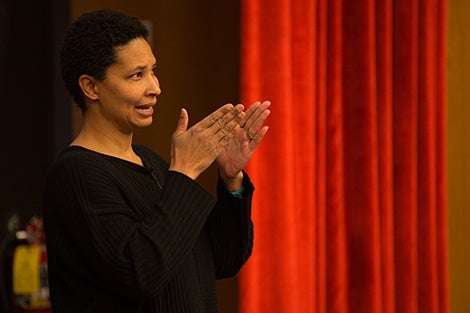November 22, 2017 – Nurturing diversity at Harvard is more than just the right thing to do, it is also a crucial component for strengthening the University’s intellectual robustness.
That was a key message from Danielle Allen, James Bryant Conant University Professor and Director of the Edmond J. Safra Center for Ethics at Harvard, who spoke November 15 at Harvard T.H. Chan School of Public Health about the University’s efforts to achieve “inclusive excellence.” Allen is co-chair of the Presidential Task Force on Inclusion and Belonging, which was convened by President Drew Faust last fall to consider a set of important and interrelated questions designed to advance Harvard on the path from diversity to belonging.
There are two core ideas behind inclusive excellence, Allen told a large audience in Kresge G-1. One is that maximizing diversity among those in intellectual pursuits enables institutions to reach “the highest heights of intellectual achievement,” she said. The second is that institutions must work actively to support people’s academic and professional success in order to get the best out of the potential that diversity brings to any community.
Allen, a political theorist, offered examples from her own life to explain the importance that diversity brings to intellectual pursuits.
In 1994, her home state of California enacted one of the nation’s harshest “three strikes” laws, which required those who committed a violent felony and two other serious crimes to be sentenced to life in prison. It prompted a swift rise in mass incarceration. Around the same time, while she was studying ancient Athens at Princeton, Allen was struck by the fact that she found few mentions of prisons—which led her to question whether or not the Athenians used imprisonment as a punishment. It was a research question that no one else had yet explored, and it led to her dissertation on the topic.
Allen’s experience growing up also informed her 2017 book, Cuz: The Life and Times of Michael A., about her cousin Michael—who was imprisoned at age 16 after a failed carjacking, and was murdered at age 29 shortly after his release.
Allen also gave an overview of the work of the Presidential Task Force, which plans to issue a report with recommendations early next year on how to boost diversity, inclusion, and belonging at Harvard. The task force is exploring a variety of options, including:
- Making campus spaces more welcoming to all groups;
- Developing new strategies to recruit faculty from diverse backgrounds;
- Boosting strategic planning regarding diversity efforts and better aligning these efforts across the university; and,
- Fostering research at Harvard on diversity, inclusion, and belonging in higher education.
photo: Sarah Sholes
